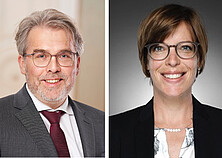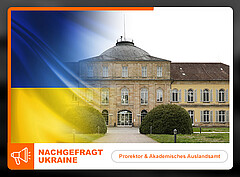War in Ukraine [01.03.22]
How are Ukrainian students doing at the University of Hohenheim? Are outgoings affected by the consequences of the war? What effects does the attack of the Russian Federation have on partnerships at the University of Hohenheim? The Online Courier spoke with Prof. Dr. Andreas Pyka, Vice President for International Affairs, and Franziska Schenk, Head of the Office of International Affairs, about the current situation.
12 students from Ukraine are currently studying at the University of Hohenheim. Do you know how they are doing?
Schenk: As events are unfolding at a rapid pace, we do not yet have a complete picture. But we naturally assume that everyone is very worried about relatives and friends and is in a state of emergency in view of the events.
We want to be there for these students, not only right now, but also in the weeks and months to come.
We have therefore contacted all Ukrainian students by email and asked them specifically whether they need help and if so, in which way. It is possible, for example, that the students will suddenly lose their financing or that they need a semester leave of absence at short notice. We want to look for solutions in such cases together and without a lot of bureaucracy.

Im Interview: Prof. Dr. Andras Pyka, Prorektor für Internationalisierung, und Franziska Schenk, Leiterin des Akademischen Auslandsamts.
The ministry also announced today that students from Ukraine and refugees who take up studies in Baden-Württemberg will not be charged tuition fees. It will also be examined how Ukrainian researchers can be pragmatically supported in Baden-Württemberg.
Are Hohenheim students or researchers actually in the war zone?
Pyka: We are not aware of any university employees currently in Ukraine. The University of Hohenheim currently has no exchange programs or ongoing scientific cooperation with Ukrainian universities.
Nevertheless, we feel very connected to Ukrainian universities. For example, we are networked with the National University of Life and Environmental Sciences and the Dmytro Motornyi Tavria State Agrotechnological University through the ICA (Association for European Life Science Universities). And we also had many joint research projects with Ukrainian partners in the past through the former Eastern Europe Center.
Kontakt |
|---|
Alle Uni-Angehörigen, die durch den Krieg in Schwierigkeiten geraten, können sich an das Akademische Auslandsamt wenden: +49 (0)711 459 23972 |
Our heartfelt solidarity goes out to all of them at the moment. President Putin's attack is also an attack on the values that we as researchers stand for. In this situation, it goes without saying that we at the University of Hohenheim actively support offers, scholarships, and networks for endangered scientists.
What is the situation with student exchanges on the Russian side?
Schenk: We have exchange programs with four Russian universities. One Russian exchange student is currently in Hohenheim and two Hohenheim students are currently outgoings in Moscow.
We are particularly concerned about the latter at the moment, even if they are not threatened by armed conflicts there. Because of the flight bans, a possible return to Germany is difficult at the moment. It cannot be ruled out that they will also have difficulties withdrawing money due to the financial sanctions.
Zum Thema |
|---|
Both students are in contact with the German Foreign Office, and we at the university are of course maintaining communication.
19 students with Russian nationality are also enrolled for full-time studies at the University of Hohenheim. Their situation is probably not easy at the moment either.
Pyka: That's right. One message is therefore really important to us: These students have absolutely nothing to do with the war that the Russian president is waging against Ukraine. We must neither condemn them nor exclude them now. The same applies, of course, to employees of Russian origin.
So far, we have all learned and worked together peacefully on the Hohenheim campus and I have no doubt that this will continue to be possible.
Schenk: We have already had the first inquiry from a Russian student as to whether she will now be exmatriculated: The answer is a clear no. Russian students may also need our support now. They, too, may be affected by flight bans and financial sanctions. The Russian government is also taking a hard line against anyone who expresses criticism.
Aktuelle Berichterstattung |
|---|
Die Hochschulen legen als Reaktion auf den Angriffskrieg russische Kooperationen auf Eis. Als Vorsitzender des Landesrektorenkonferenz äußert sich dazu auch Uni-Rektor Prof. Dr. Stephan Dabbert. |
Of course, Russian students - and all other university members, regardless of their nationality - can also contact us if they are directly or indirectly affected by the war or if they have any questions. For researchers, the Welcome Center is the first point of contact.
The DAAD has suspended funding for activities with Russia for the time being. In addition, the Alliance of Science Organizations has called for scientific cooperation to be put on hold. What does that mean for the University of Hohenheim?
Schenk: It affects future programs, but not current ones. Of course, stays can be canceled at personal request. For exchanges in both directions, however, funding has actually been suspended until further notice. We will keep students affected directly informed.
Pyka: As far as scientific collaborations are concerned, the Ministry has asked us to comply with the Alliance's appeal. The Research Support Department and the Office of International Affairs are therefore asking all Hohenheim scientists to get in touch if they have projects with Russian participation or are planning new projects.
Zum Thema |
|---|
Russische Wissenschaftlerinnen und Wissenschaftler rufen in einer Petition zur Beendigung des Kriegs auf: |
At the moment, we are only aware of one active research cooperation with Russia: Since 2018, there has been an agreement with a university consortium in Yakutia, under which several projects with the specializations of sustainable living, One Health, bioeconomy, and biodiversity have been carried out. Currently, a DFG-funded project is still ongoing.
Mr. Pyka, what do you personally think of the step to also discontinue scientific cooperation and student exchange with Russia?
Pyka: As a state institution, we are not acting as a political actor in this matter, but are following the line of the ministry.
It should be noted, however, that the step actually represents a clear departure from the previous foreign policy on science. Until now, the argumentation has been that it is important to remain in exchange at the civil society level, even and especially in times of crisis.
In my opinion, the value of this exchange cannot be overestimated. We are currently seeing that Russian academics are among the groups that are speaking out against Putin and his war, despite the threat of reprisals. It is important to support them and to keep the dialogue going, especially among young people like students.
It is therefore to be hoped that political decision-makers will always take these considerations into account and constantly and critically review the measures adopted in accordance with further developments.
We will report back. Thank you very much for the interview!
Interview: Leonhardmair / Translation: Neudorfer


